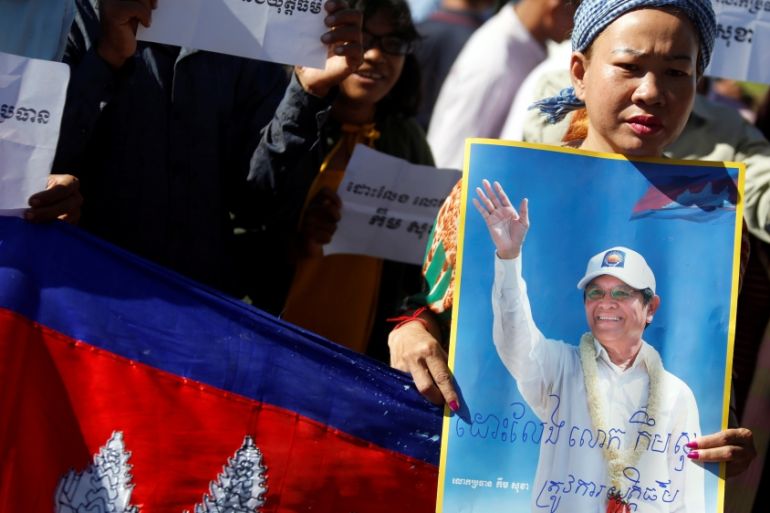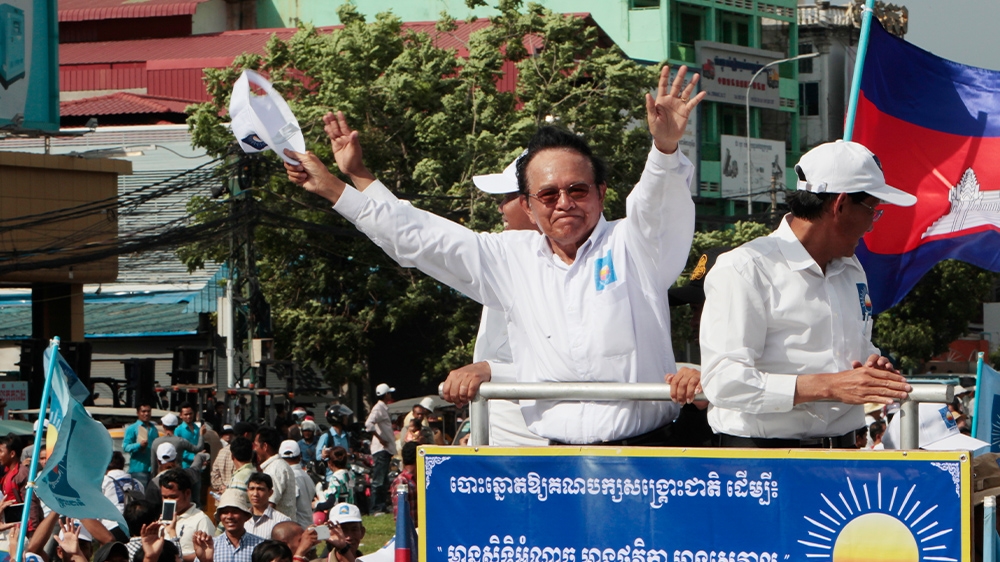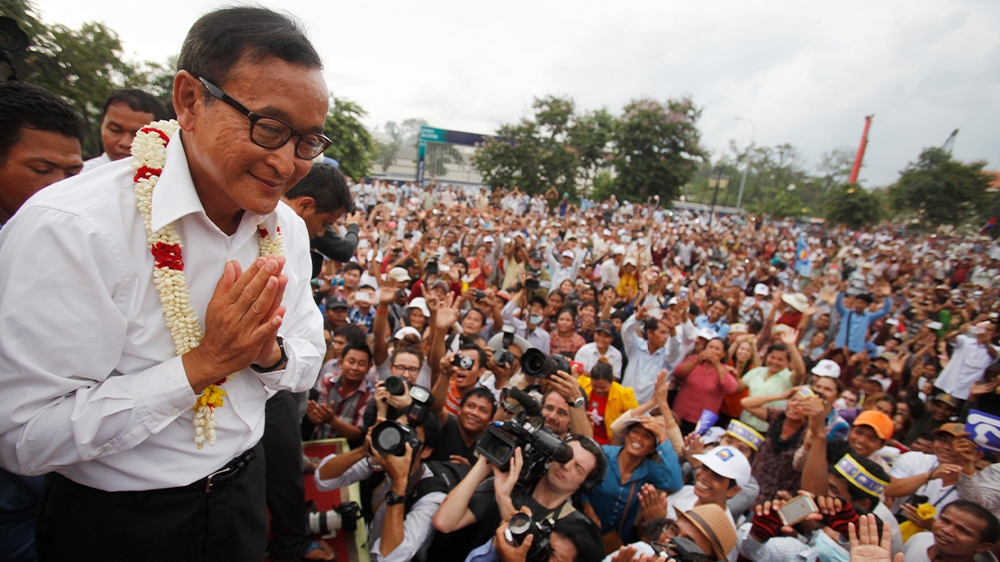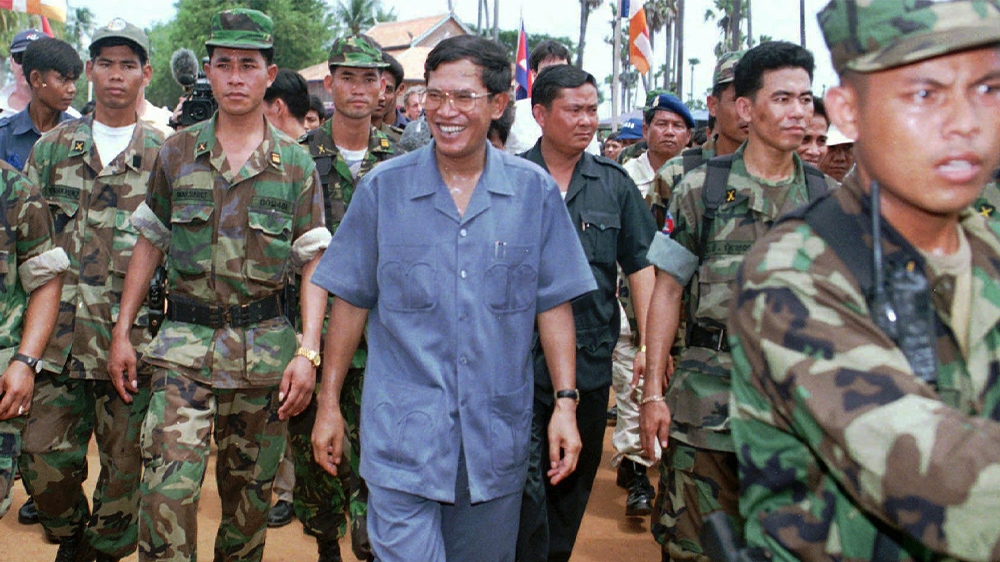Cambodia steps up opposition crackdown as Rainsy return nears
Government of longtime leader Hun Sen claims Rainsy’s return is a “coup”, threatening long jail terms for supporters.

Phnom Penh, Cambodia – Authorities in Cambodia have labelled opposition leader Sam Rainsy’s plan to return next month from exile a “coup”, and stepped up a crackdown on his supporters.
At least 27 members of the banned Cambodia National Rescue Party (CNRP) have been arrested since the start of the year accused of plotting a coup and many more have faced various other political charges, the party said.
Keep reading
list of 4 itemsWorld Press Freedom Day: Gaza conflict deadliest for journalists
Israeli firms sold invasive surveillance tech to Indonesia: Report
Abu Ghraib: Iraqi victims’ case against US contractor ends in mistrial
“I have serious concerns that other CNRP supporters and I could get arrested,” supporter Mao Chhorn told Al Jazeera. “I myself have often been followed by local authorities and secret police.”
|
|
Most have been arrested for sharing Facebook posts supporting the return of Rainsy, a co-founder of the party, on November 9.
Officials say that any people they deem to be involved in what they call “the coup” will face five to 10 years in prison – and civil servants will get a life sentence.
“Prime Minister Hun Sen and the government are cracking down on the CNRP rank and file, the various commune, district and provincial level leaders who are critical for the party to function,” said Phil Robertson, deputy director of Human Rights Watch’s Asia division.
Seng Sokhon, a former commune chief, was charged last week as an accomplice to treason, but allowed to go free after confessing, and condemning Rainsy in a video released by the government.
Three former party members were arrested in September, and charged with “public insult” after they discussed Rainsy’s return on the phone. Police read the transcript of the call to them after recording it secretly.
Chhorn said he had become more careful.
“I stopped commenting especially on social media about the current situation after so many CNRP members and supporters were threatened and arrested,” he said.

Antagonistic history
The political crisis began in 2017, when CNRP co-founder Kem Sokha was arrested for treason and the party dissolved after a strong showing at the local commune elections. Sokha has been under house arrest since.
The dissolution turned Cambodia into a de facto one-party state, and drew serious criticism from Western countries including the European Union.
In an apparent bid to preserve Cambodia’s preferential trade deal with the EU, Hun Sen relaxed the situation and released political prisoners.
|
|
But after Rainsy announced in August he would return, the crackdown resumed.
“There has been far too little reaction to this intensifying crackdown by diplomats and the UN. What’s needed is much higher volume public denunciations in Phnom Penh and foreign capitals of the government’s repressive campaign,” Robertson said.
Rainsy and Hun Sen have a long, antagonistic history that began when Rainsy served as Minister of Finance in the royalist party Funcinpec in the 1990s, where he built a reputation as a crusader against corruption.
He formed his own party in 1995, gaining a strong following among factory workers and young people.
For the next 20 years, Rainsy engaged in a delicate balancing act, criticising the government, fleeing the country to avoid charges, and then compromising with Hun Sen to secure his return.
But each time he returned, his party gained steadily in support and representation.
After founding the CNRP with Sokha, the opposition made massive gains in the 2013 and 2017 elections and Rainsy became a more significant threat to Hun Sen’s decades-long hold on power.

‘Usurper’
In recent months, Rainsy has stepped up his rhetoric, and Hun Sen has threatened to deploy the armed forces.
Rainsy denies he is escalating the situation, insisting he is only reacting to Hun Sen’s own unacceptable escalations.
“It is important to make Hun Sen appear as a usurper who has stolen power from the people through the fake 2018 election held without the participation of the CNRP as the only credible opposition party,” he said in an email to Al Jazeera.
“This in turn justifies our call for a popular uprising because it is legitimate to seek to topple an illegitimate regime.”
Still, Rainsy has alienated Phnom Penh’s intelligentsia, even among those critical of the government.
In recent weeks, speaking to more highly-educated Cambodians, Rainsy has been called a “rabbit” for his tendency to flee, and drawn unfavourable comparisons with Game of Thrones character Littlefinger – a clever but conniving politician mostly defined by his self-interest.
But Rainsy’s focus has always been elsewhere.
“The Cambodian ordinary people’s common sense and heartfelt support is more important than speculations from a few ‘intellectuals’,” Rainsy countered.
Political analyst Ou Virak said he doubted Rainsy would return, but cautions against the idea that November 9 would “make or break” his career.
“People already assume that if he promises to come and doesn’t come it will be the end of his political career, but no, it won’t be. He’s done this before,” Virak said.
Virak said the “best case scenario” for Rainsy would be if he was physically prevented from entering Cambodia in the first place.
“Then he can claim moral victory and claim that Hun Sen is afraid,” Virak said.
Indeed, Rainsy already points to the ongoing crackdown as evidence of Hun Sen’s fear, which he has described as a “a victory for the CNRP”.

Opportunity for change
Some have criticised Rainsy for putting his supporters in danger while he lives in safety abroad – he’s been in exile in Paris since 2015.
But CNRP vice-president Mu Sochua, said it was unfair to blame Rainsy for Hun Sen’s human rights violations.
“Is it Sam Rainsy or us putting victims in jail? Or are we victims too, direct targets of Hun Sen whose only goal is to stay in power?” she asked.
Rainsy’s closest political ally, Sochua also began her political career at Funcinpec, serving as Minister for Women’s Affairs from 1998 to 2004.
She defected after the assassination of union leader Chea Vichea, inspired by Rainsy’s demands for justice and disappointed by Funcinpec’s silence.
“I share his ethics, I share his principles for justice, I share his sense of commitment,” Sochua said.
His base still believes in him.
Virak said Cambodia now faced its best opportunity for change in the last 25 or 30 years because of growing strains within society.
“You have a backlash against Chinese [influence], you have not just a growing economy but growing inequality, you have a population that is mostly 25 years old and younger. All of those ingredients add up to a volatile situation,” he said.
And as Virak added: “His base still believes in him.”
A tuk-tuk driver told Al Jazeera he did believe Rainsy would return.
“Lots of people expect him to come back and we’re waiting for him,” he said.
A youth supporter was less certain, but said he wouldn’t blame Rainsy if he didn’t want to risk it.
“Right now it’s more and more sensitive. Since he announced the date, the government arrested a lot of his supporters, so I think even if he wanted to come back it would be very challenging,“ he said.
Both said they had not lost any of their admiration for Rainsy, and refused to choose between him and Sokha.
“Both of these opposition leaders need to stand strong together, otherwise they won’t have enough power and supporters to fight the CPP and promote democracy,” the tuk-tuk driver said. referring to the ruling Cambodia People’s Party.